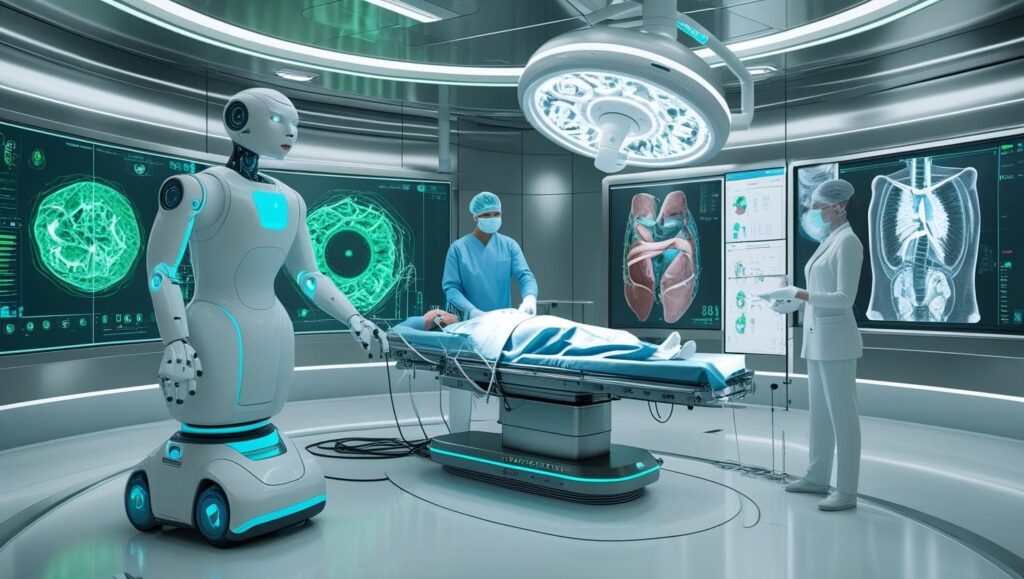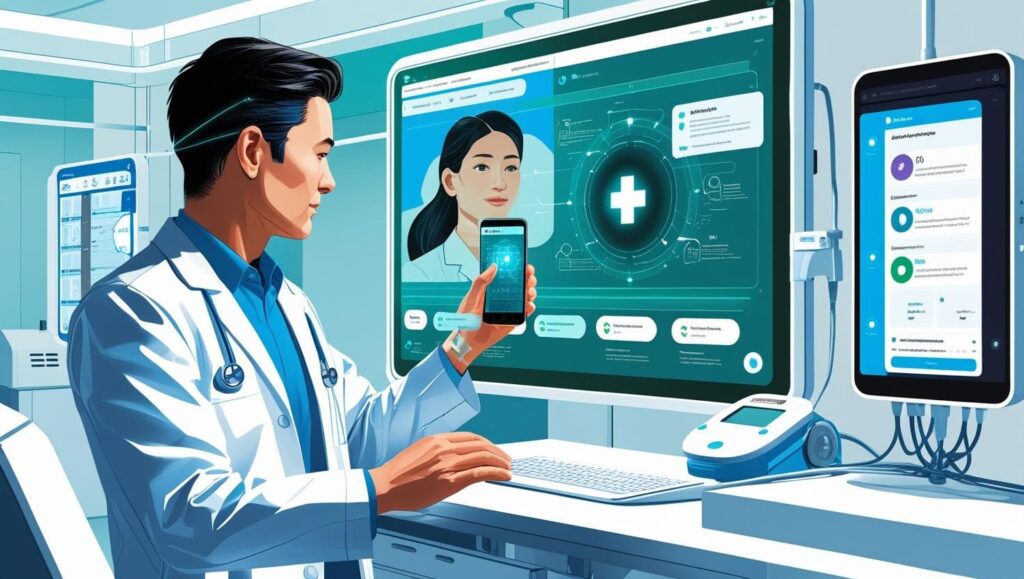

AI trends in healthcare focus on advancements like predictive analytics, personalized medicine, AI-driven diagnostics, robotic surgery, and virtual health assistants. These innovations aim to improve patient care, enhance clinical efficiency, and optimize treatment outcomes. AI is also transforming drug discovery and medical imaging with increased accuracy.
Hospitals today are almost unrecognizable from what they used to be. The screens, sensors, and tech everywhere can sometimes feel like a whole new world, but it’s all there to make healthcare better.
Doctors can now scan thousands of patient records at once and give an early warning before a major health issue pops up. Then there are the surgical robots. Yes, they’re still operated by humans, but they’re capable of sewing up cuts as thin as a thread, and they don’t need to clock out at the end of the day. They can keep going into the late hours, never complaining.
What’s really wild is the pace at which things are changing in healthcare. The tech isn’t just useful, it’s transforming everything from patient care to how hospitals operate day-to-day. This guide will give you an insight of the AI trends leading the charge, and trust us, you will be shocked to know about them.
All around the world — from Africa to Europe to Asia — healthcare workers are diving into artificial intelligence to cut down on paperwork, stay within budget, and untangle even the messiest cases. The goal? Leaner workflows, quicker diagnosis, and broader access to care for more people.
But here’s the thing: these new AI systems aren’t just sitting idle once they’re in place. They’re constantly learning, adapting, and improving the hospital setup. In some places, this smart tech is so on-the-ball that it sends alerts, helps change treatment plans, and sets up new systems before lunch. It’s like having a really efficient team member who’s always two steps ahead.
Hospitals, especially those next to smaller startups, are no longer just going by gut feeling. Instead, they’re relying on hard data. It tracks things like lives saved, missed complications, and how quickly staff can wrap up their shifts. And the results? Well, they speak for themselves.

A few years ago, doctors were making risk models based mainly on gut feeling and old-school methods. Fast forward to today, and AI is digging deep into things like eating habits, DNA, and clinic notes to predict health issues before they even start. When tools spot things like potential heart problems or breast cancer, doctors can jump into action much quicker. This helps prevent serious harm down the line.
Generative AIs are changing how we think about developing new drugs. Instead of sitting down with paper and pencils, these AIs design drug candidates the same way an architect might sketch out a city skyline. And it’s happening overnight, drugmakers are speeding up the process by cutting years off development, while still discovering groundbreaking drugs.
AI-driven pattern recognition is making waves in medical imaging. Imagine a machine scanning through piles of MRIs and chest X-rays in the time it takes to sip your coffee. It’s not just scanning. It’s flagging tiny issues such as five-millimeter dots that doctors might miss. This means fewer mistakes and faster, more accurate diagnoses.
Picture this: it’s late at night, and you’re feeling a little off. Instead of waiting hours for a doctor’s appointment, you text a health assistant chatbot. This little robot checks your symptoms—cough, fever, nausea, and fires back advice while the rest of the world sleeps. In clinics, these assistants help doctors provide care in places where time and staff are limited. A quick chat, and you’re feeling more confident about your next steps.
Surgical robots aren’t just a sci-fi dream, they’re a reality. In operating rooms, metal arms are now sewing up wounds and moving cameras with incredible precision, almost like they’ve got a mind of their own. By the time the incision is fully healed, most families are still halfway through lunch.
Meanwhile, as the robot does its thing, it’s also monitoring things like blood pressure. This allows the nurses to focus on what really matters.
Imagine this: a doctor’s office sends a patient’s gene data, lab results, and even a few handwritten notes into an AI system. The software processes it all in no time and generates a treatment plan. This helps patients avoid the toughest parts of chemotherapy. But cancer specialists will tell you: the real skill lies in knowing which treatment works best for each patient.
Ever seen a tiny wristband that tracks your pulse, oxygen levels, and heart rate? It’s not just a fitness tracker. These smart wristbands gently buzz when something’s off, giving early warning signs before a major health emergency happens. Surgeons say it’s a game changer, calming patients and giving healthcare teams a heads-up when it counts the most.
Hospital command boards now use algorithms to predict things like bed availability, discharge times, and patient admission trends. It’s like a high-tech crystal ball. Ward clerks swear by the system, which helps eliminate double-bookings and shrinks waiting lists by spotting free beds or openings that might have otherwise been missed.
Doctors often scribble quick notes at the bedside and mention dosages or cracking jokes about lab results. Now, thanks to Natural Language Processing (NLP). It’s a service that can check on that chatter and attach it to the correct patient file. Residents love it because they spend less time typing and more time keeping track of what happened during those chaotic 3 AM shifts.
Feeling down or stressed? Personalized apps are now here to help. With just one check-in, they can track your mood and send a reminder if you’re starting to feel overwhelmed. Therapy chatbots can fill in the gaps, offering quick exercises and a listening ear, even when it’s after office hours.

AI is quietly making its way into hospitals and clinics, and the benefits are starting to show for pretty much everyone involved:
Clinicians, for instance, are getting a bit of extra time back in their day. Algorithms are”
Doctors and nurses can focus more on patients, instead of being buried under repetitive tasks.
For patients, the change is even more noticeable. They’re:
And the best part? Help is often just a click away!
As for health systems, they’re cutting down on inefficiencies and finally rolling out fixes that can benefit everyone, whether you’re in the heart of the city or out in a rural area. It’s all part of leveling the playing field when it comes to healthcare.
What used to be considered revolutionary is now just… normal. AI-driven medicine that thinks ahead, plans, and moves before an illness even has a chance to take hold.
The global push for AI in healthcare is being led by a wide range of players:
Emergency rooms and ICUs are now using machine-learning models to track vital signs, flagging early warning signs and guiding clinicians on the next steps. It’s like having a backup brain that makes sure nothing slips through the cracks.
Automated algorithms are sifting through huge trial databases, helping researchers spot promising molecules, and even suggesting which patients might respond well (or not) to new treatments. It’s all about speeding up research and getting drugs out there faster.
There’s been an explosion of startups integrating AI into simple things like smartphone apps, wristband sensors, and handheld analyzers. The goal? Making technology smarter, but still easy enough for everyone to use, even if you’re not a tech expert.
Remember when computers were just used for crunching numbers? Now, they’re analyzing gene data and identifying patterns that humans might miss, bringing new insights to the world of genomics.
WebOsmotic is partnering with hospitals and clinics that are ready to let AI step in and do its thing—predicting flare-ups, cutting through admin clutter, and giving telehealth a much-needed boost. This isn’t some one-size-fits-all solution; every dashboard and algorithm is designed to integrate quickly, handle sudden surges, and keep patient data secure.
If you’d rather be leading the way than playing catch-up, drop us a message. We’ll show you how tomorrow’s tech can transform into care that’s ready for today.